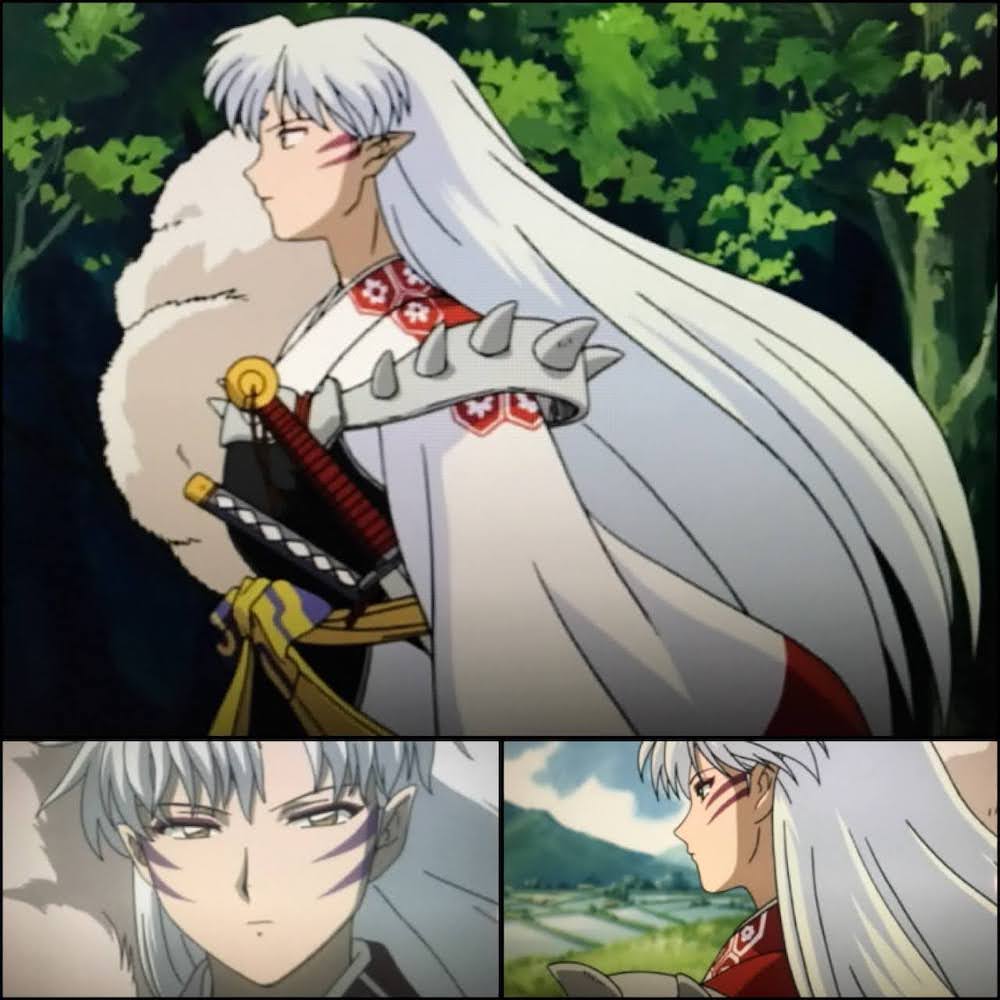
Inuyasha (seasons 1-6, plus Inuyasha: The Final Act; 196 episodes(!) total)
Based on the manga by Rumiko Takahashi
Published in English by Viz Media, LLC, San Francisco
2000 – 2004 and 2009 – 2010
So! The last quarter of 2020 really got to me, and I needed a vacation for my mind. While poking around HBO during the holiday break, I came across Inuyasha by the remarkably talented Rumiko Takahashi, the same manga artist who created the most popular manga / anime stories of my youth. [Imagine I’m narrating flashbacks from the late 80s and early 90s of going to university anime clubs, to see fan-subtitled or fan-dubbed versions of her work in overflowing lecture halls after classes ended!] I read about this series online – you don’t even have to finish wording your Google search before realizing that it’s a phenomenon, and people want to know WHY it is so popular.
It’s popular because it has so much going for it!
Why did I commit so many hours of my life (plus a few hundred dollars to purchase all seven seasons to watch at my convenience) to see the story through to the end? I WILL TELL YOU. (You knew this.)
First, a long-ish synopsis: Kagome, an ordinary Japanese high school girl in the modern world, travels through an old well to an alternate-universe-version of feudal Japan, where magic is real, demons (including harmless, friendly, nature spirits) are everywhere, and she is a reincarnation of a powerful priestess. She teams up with a dog-eared youth, Inuyasha, to save the world from evil once her magical jewel is broken and scattered across the land. A villain named Naraku is their main competition to reassemble the powerful jewel, and he is a part of Inuyasha & prior-Kagome’s tragic past.
There are TONS of other characters, weapons with special abilities, curses, incarnations of Naraku (characters made out of his flesh, but functioning as independent characters), love triangles, rivalries, discrimination, demons who look like monsters, demons that look like impossibly beautiful men, beautiful demons that have crushes on other beautiful demons, light physical comedy, teenage awkwardness, and a collection of small, shrill sidekicks who help explain the story to the audience by having things explained to them. (You annoy me, Shippo!) I will just write about my favorite elements of this.
I love isekai stories. My kindergarten notebooks have my early, handwritten stories of little girls who find strange caves and wind up in another world. These portal stories are so common in Japanese fiction that the genre has a name: Isekai (wikipedia.org). Kagome’s trips between contemporary Japan and fantasy magical feudal Japan through the well put this in that category.
The isekai elements feel metaphorical. Even if this is just a “feudal fairy tale,” as the opening credits put it, it FEELS like it represents something else. Kagome has a really rough time balancing out her obligations in the contemporary world – the scenes where she freaks out in class because she doesn’t understand her math tests AT ALL are hilarious! – with her life as a demon-slayer in the feudal one. She has unique skills that her team needs in the feudal world, while she is just another student in the contemporary one! She literally saves lives in the feudal world, but this other life of hers is secret from her classmates. (Thankfully, her family is very supportive.) Having important parts of your life that no one knows about is a relatable structure.
I love the background art. There are more “realistic” styles of anime, but Inuyasha is illustrated in a “classic” style that Takahashi helped establish. Big eyes, big hair, tiny mouths – that’s part of what makes this style. Meanwhile, the background art, skies, sunsets, streams, forests, and seasons are all lovingly rendered. As a watercolorist, I really appreciate the effort that went into these!

If I created even a tiny number of works of this quality, I would be so proud!
In addition to the beautiful representations of nature, there are great, very specifically Japanese renditions of palaces, food, sword hilts, houses, temples, and other details. The sort of things I studied back when I was in architecture, and/or on visits to Japan. People who really LIKED these things drew them, and that inspires my appreciation.
Feudal life is harsh, and bad things happen, which raise the stakes. Characters die. Everyone on the team has lost at least one immediate family member to a premature death. Many of them are coping with past traumas, which make them vulnerable and give them emotional baggage. This is the only anime I’ve seen where the main characters REGULARLY spend time burying entire villages of slain bystanders. It makes the evil they are battling more real, and also explains the anti-demon discrimination and rejection their group experiences, even if their demons are ‘good guys.’ Even some of the villainous characters feel trapped in their situations, and the main protagonists sometimes rescue them; little truces and scenes of mutual assistance spring up from time to time, and some characters have ambiguous motivations…
Lord Sesshōmaru is beautiful. I figured this out on my own, but if I hadn’t, there are multiple characters who swoon over him to be sure I get the picture. I’ve burst out laughing with, “Lord Sesshōmaru is SO DASHING!” spontaneously when he has appeared on screen, because they trained me well. (Lesson: definitely leave offerings of food to beautiful men you encounter in forests. I’m just saying.) He is always impeccably dressed. And he doesn’t let losing an arm phase him, nor change the flow of his sleeves.

The English dialog is skillfully done. There were EXCELLENT script consultants for Viz’s dubbed scripts! There’s a scene where two heros are bickering, and one of their friends remarks that both of the guys are “as dumb as a sack of hammers,” and that is EXACTLY RIGHT. I’m sure the original Japanese insult was amazing, but this shows great skill.
The characters develop. The protagonists each have their own traumas to manage, and each bears a separate grudge against Naraku, which they had planned to resolve independently. Over the series, they learn that they are more effective as a team, develop awareness beyond their own pain, and properly look after each other. Even Inuyasha, who begins as a self-centered man-child, and, um… stays that way for a very long time, eventually becomes aware of other people’s feelings. You WANT him to develop, because Kagome loves him immediately.
The story has a solid structure, and clear goals. The core story is the battle against Naraku and his increasingly strong/difficult minions, and it’s a clear, simple setup with plenty of opportunity for variations. There are episodes which don’t move the story forward, yes, including some back stories for minor characters (Shippo!?!?), but even when they can’t find the main villain, the protagonists pick up a skill, or reaffirm their values, or make friends. The episodes are about 20 minutes apiece, so you can knock out three in an hour and feel like something happened!
There are other things to enjoy about this series – that theme music for Season 6 is so good! – but I need to stop before I scare you. Like any creative product, there are periodic imperfections, but that’s to be expected in such a vast collection, and the quality remains very high. Characters look hastily drawn now and then; the restart after a long gap between Season 6 and Final Act felt abrupt to me as a binge-watcher (which was not the expected experience at the time it was made), and some of the tiny, loud characters get more screen time than I’d like. Happily, the last season really picked up pace once it got going, and was EVENTFUL. I’m glad I watched through to the end.
So: I highly recommend this classic, high volume, well-executed, charming series. Go reave some iron and steal some souls!
